Organizational Behavior: Mark Zuckerberg's Leadership Analysis Report
VerifiedAdded on 2023/06/07
|5
|790
|410
Report
AI Summary
This report examines the leadership of Mark Zuckerberg, focusing on his journey from the early days of Facebook to becoming a prominent figure in the business world. It explores the challenges he faced, such as criticisms and attracting investors, and highlights key lessons learned, including the importance of passion, setting long-term goals, and exploring details before commitment. The report delves into the application of organizational behavior principles to Zuckerberg's leadership, emphasizing his role as a role model for young entrepreneurs and his ability to navigate the competitive market. It also references relevant academic sources to support its analysis, providing a comprehensive overview of Zuckerberg's leadership style and its impact.
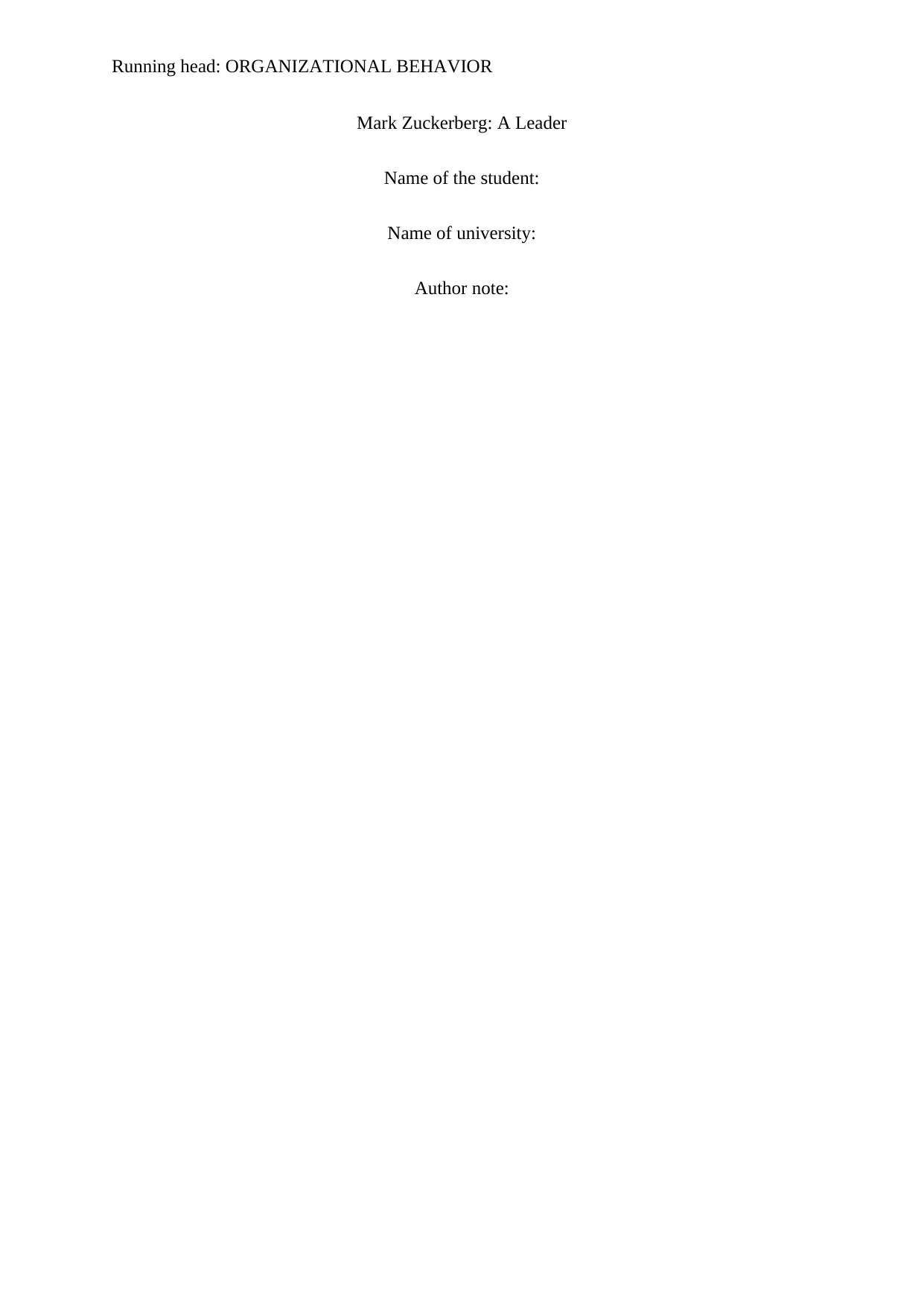
Running head: ORGANIZATIONAL BEHAVIOR
Mark Zuckerberg: A Leader
Name of the student:
Name of university:
Author note:
Mark Zuckerberg: A Leader
Name of the student:
Name of university:
Author note:
Paraphrase This Document
Need a fresh take? Get an instant paraphrase of this document with our AI Paraphraser
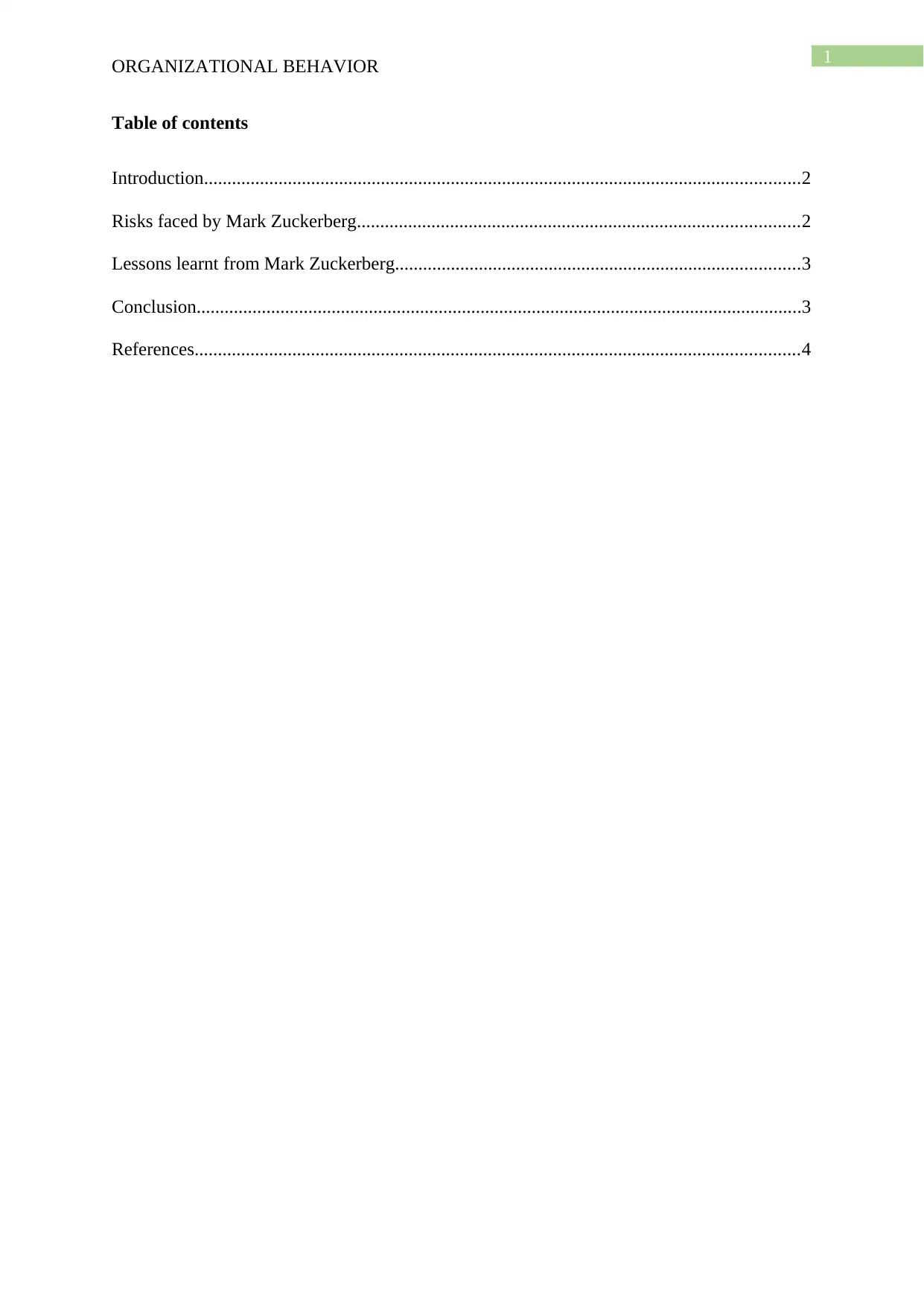
1
ORGANIZATIONAL BEHAVIOR
Table of contents
Introduction................................................................................................................................2
Risks faced by Mark Zuckerberg...............................................................................................2
Lessons learnt from Mark Zuckerberg.......................................................................................3
Conclusion..................................................................................................................................3
References..................................................................................................................................4
ORGANIZATIONAL BEHAVIOR
Table of contents
Introduction................................................................................................................................2
Risks faced by Mark Zuckerberg...............................................................................................2
Lessons learnt from Mark Zuckerberg.......................................................................................3
Conclusion..................................................................................................................................3
References..................................................................................................................................4
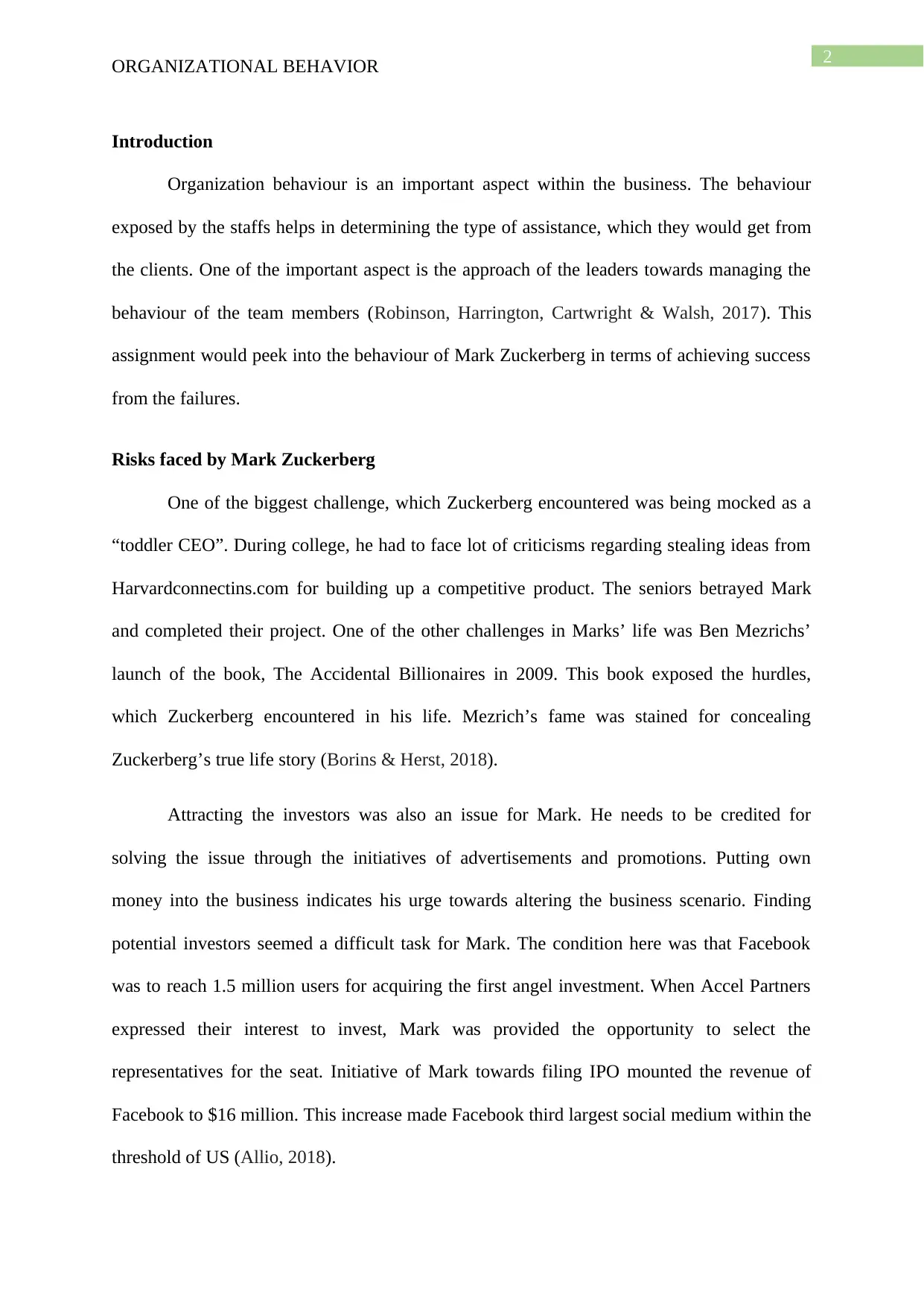
2
ORGANIZATIONAL BEHAVIOR
Introduction
Organization behaviour is an important aspect within the business. The behaviour
exposed by the staffs helps in determining the type of assistance, which they would get from
the clients. One of the important aspect is the approach of the leaders towards managing the
behaviour of the team members (Robinson, Harrington, Cartwright & Walsh, 2017). This
assignment would peek into the behaviour of Mark Zuckerberg in terms of achieving success
from the failures.
Risks faced by Mark Zuckerberg
One of the biggest challenge, which Zuckerberg encountered was being mocked as a
“toddler CEO”. During college, he had to face lot of criticisms regarding stealing ideas from
Harvardconnectins.com for building up a competitive product. The seniors betrayed Mark
and completed their project. One of the other challenges in Marks’ life was Ben Mezrichs’
launch of the book, The Accidental Billionaires in 2009. This book exposed the hurdles,
which Zuckerberg encountered in his life. Mezrich’s fame was stained for concealing
Zuckerberg’s true life story (Borins & Herst, 2018).
Attracting the investors was also an issue for Mark. He needs to be credited for
solving the issue through the initiatives of advertisements and promotions. Putting own
money into the business indicates his urge towards altering the business scenario. Finding
potential investors seemed a difficult task for Mark. The condition here was that Facebook
was to reach 1.5 million users for acquiring the first angel investment. When Accel Partners
expressed their interest to invest, Mark was provided the opportunity to select the
representatives for the seat. Initiative of Mark towards filing IPO mounted the revenue of
Facebook to $16 million. This increase made Facebook third largest social medium within the
threshold of US (Allio, 2018).
ORGANIZATIONAL BEHAVIOR
Introduction
Organization behaviour is an important aspect within the business. The behaviour
exposed by the staffs helps in determining the type of assistance, which they would get from
the clients. One of the important aspect is the approach of the leaders towards managing the
behaviour of the team members (Robinson, Harrington, Cartwright & Walsh, 2017). This
assignment would peek into the behaviour of Mark Zuckerberg in terms of achieving success
from the failures.
Risks faced by Mark Zuckerberg
One of the biggest challenge, which Zuckerberg encountered was being mocked as a
“toddler CEO”. During college, he had to face lot of criticisms regarding stealing ideas from
Harvardconnectins.com for building up a competitive product. The seniors betrayed Mark
and completed their project. One of the other challenges in Marks’ life was Ben Mezrichs’
launch of the book, The Accidental Billionaires in 2009. This book exposed the hurdles,
which Zuckerberg encountered in his life. Mezrich’s fame was stained for concealing
Zuckerberg’s true life story (Borins & Herst, 2018).
Attracting the investors was also an issue for Mark. He needs to be credited for
solving the issue through the initiatives of advertisements and promotions. Putting own
money into the business indicates his urge towards altering the business scenario. Finding
potential investors seemed a difficult task for Mark. The condition here was that Facebook
was to reach 1.5 million users for acquiring the first angel investment. When Accel Partners
expressed their interest to invest, Mark was provided the opportunity to select the
representatives for the seat. Initiative of Mark towards filing IPO mounted the revenue of
Facebook to $16 million. This increase made Facebook third largest social medium within the
threshold of US (Allio, 2018).
⊘ This is a preview!⊘
Do you want full access?
Subscribe today to unlock all pages.

Trusted by 1+ million students worldwide
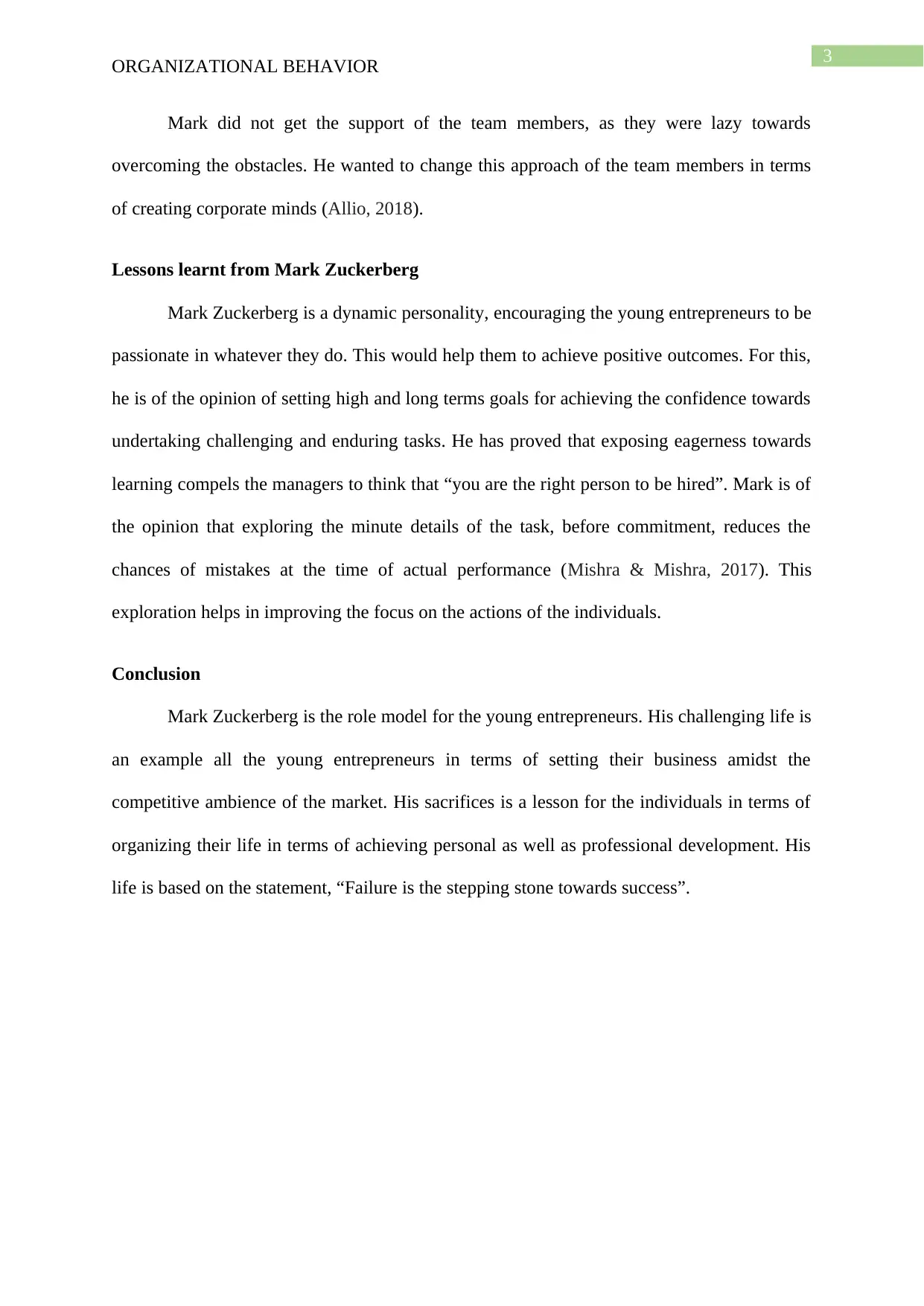
3
ORGANIZATIONAL BEHAVIOR
Mark did not get the support of the team members, as they were lazy towards
overcoming the obstacles. He wanted to change this approach of the team members in terms
of creating corporate minds (Allio, 2018).
Lessons learnt from Mark Zuckerberg
Mark Zuckerberg is a dynamic personality, encouraging the young entrepreneurs to be
passionate in whatever they do. This would help them to achieve positive outcomes. For this,
he is of the opinion of setting high and long terms goals for achieving the confidence towards
undertaking challenging and enduring tasks. He has proved that exposing eagerness towards
learning compels the managers to think that “you are the right person to be hired”. Mark is of
the opinion that exploring the minute details of the task, before commitment, reduces the
chances of mistakes at the time of actual performance (Mishra & Mishra, 2017). This
exploration helps in improving the focus on the actions of the individuals.
Conclusion
Mark Zuckerberg is the role model for the young entrepreneurs. His challenging life is
an example all the young entrepreneurs in terms of setting their business amidst the
competitive ambience of the market. His sacrifices is a lesson for the individuals in terms of
organizing their life in terms of achieving personal as well as professional development. His
life is based on the statement, “Failure is the stepping stone towards success”.
ORGANIZATIONAL BEHAVIOR
Mark did not get the support of the team members, as they were lazy towards
overcoming the obstacles. He wanted to change this approach of the team members in terms
of creating corporate minds (Allio, 2018).
Lessons learnt from Mark Zuckerberg
Mark Zuckerberg is a dynamic personality, encouraging the young entrepreneurs to be
passionate in whatever they do. This would help them to achieve positive outcomes. For this,
he is of the opinion of setting high and long terms goals for achieving the confidence towards
undertaking challenging and enduring tasks. He has proved that exposing eagerness towards
learning compels the managers to think that “you are the right person to be hired”. Mark is of
the opinion that exploring the minute details of the task, before commitment, reduces the
chances of mistakes at the time of actual performance (Mishra & Mishra, 2017). This
exploration helps in improving the focus on the actions of the individuals.
Conclusion
Mark Zuckerberg is the role model for the young entrepreneurs. His challenging life is
an example all the young entrepreneurs in terms of setting their business amidst the
competitive ambience of the market. His sacrifices is a lesson for the individuals in terms of
organizing their life in terms of achieving personal as well as professional development. His
life is based on the statement, “Failure is the stepping stone towards success”.
Paraphrase This Document
Need a fresh take? Get an instant paraphrase of this document with our AI Paraphraser
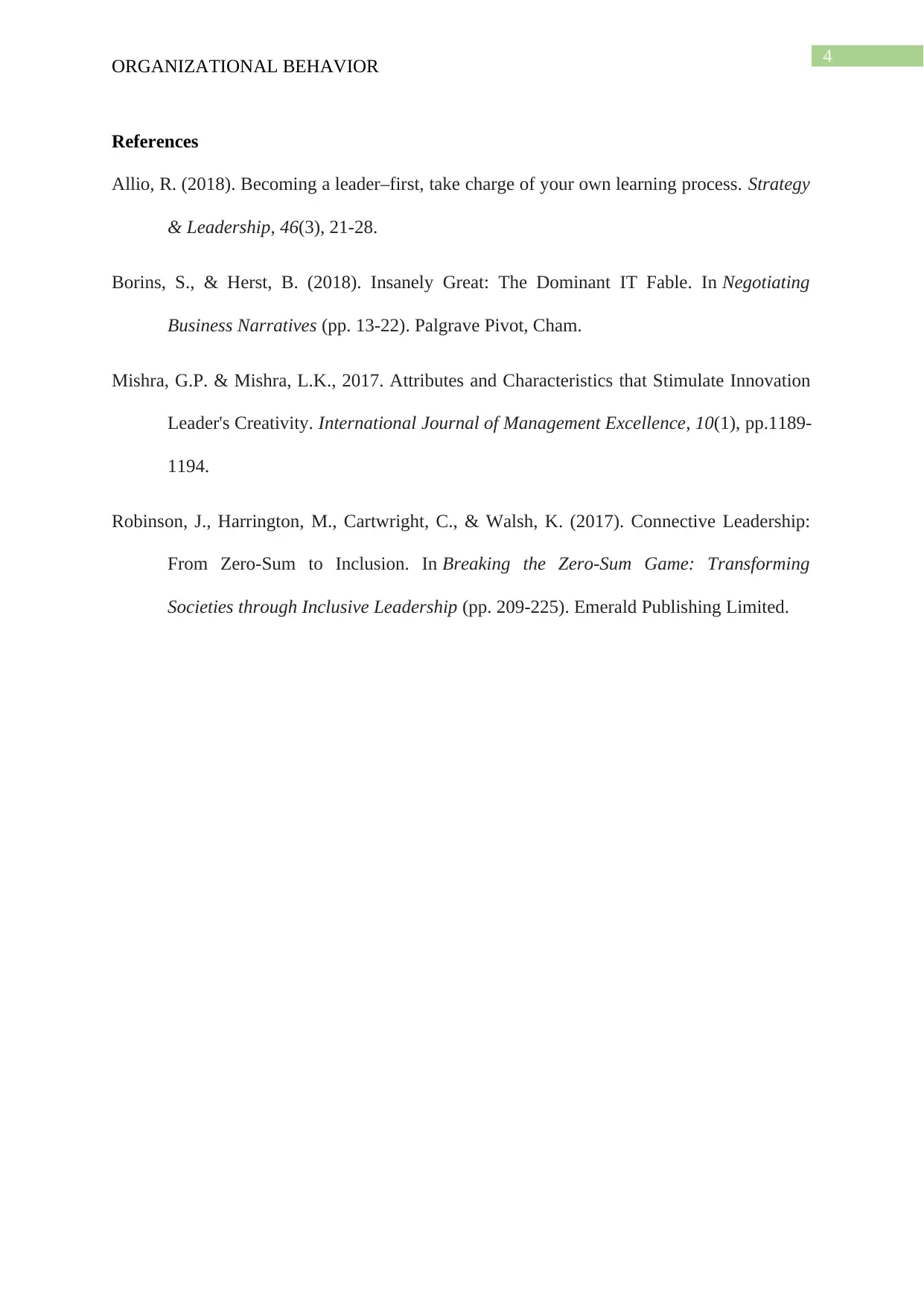
4
ORGANIZATIONAL BEHAVIOR
References
Allio, R. (2018). Becoming a leader–first, take charge of your own learning process. Strategy
& Leadership, 46(3), 21-28.
Borins, S., & Herst, B. (2018). Insanely Great: The Dominant IT Fable. In Negotiating
Business Narratives (pp. 13-22). Palgrave Pivot, Cham.
Mishra, G.P. & Mishra, L.K., 2017. Attributes and Characteristics that Stimulate Innovation
Leader's Creativity. International Journal of Management Excellence, 10(1), pp.1189-
1194.
Robinson, J., Harrington, M., Cartwright, C., & Walsh, K. (2017). Connective Leadership:
From Zero-Sum to Inclusion. In Breaking the Zero-Sum Game: Transforming
Societies through Inclusive Leadership (pp. 209-225). Emerald Publishing Limited.
ORGANIZATIONAL BEHAVIOR
References
Allio, R. (2018). Becoming a leader–first, take charge of your own learning process. Strategy
& Leadership, 46(3), 21-28.
Borins, S., & Herst, B. (2018). Insanely Great: The Dominant IT Fable. In Negotiating
Business Narratives (pp. 13-22). Palgrave Pivot, Cham.
Mishra, G.P. & Mishra, L.K., 2017. Attributes and Characteristics that Stimulate Innovation
Leader's Creativity. International Journal of Management Excellence, 10(1), pp.1189-
1194.
Robinson, J., Harrington, M., Cartwright, C., & Walsh, K. (2017). Connective Leadership:
From Zero-Sum to Inclusion. In Breaking the Zero-Sum Game: Transforming
Societies through Inclusive Leadership (pp. 209-225). Emerald Publishing Limited.
1 out of 5
Your All-in-One AI-Powered Toolkit for Academic Success.
+13062052269
info@desklib.com
Available 24*7 on WhatsApp / Email
![[object Object]](/_next/static/media/star-bottom.7253800d.svg)
Unlock your academic potential
Copyright © 2020–2025 A2Z Services. All Rights Reserved. Developed and managed by ZUCOL.

